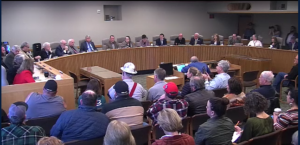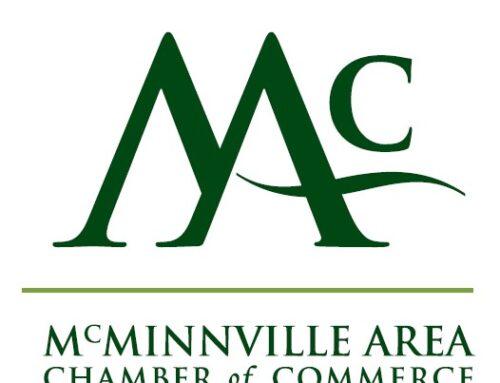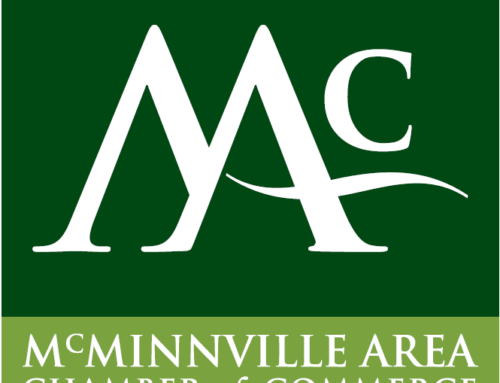
As we head into week 4 of this year’s short legislative session, the news from Salem is going to be coming at Oregonians hard and fast. After a contentious morning hearing in the legislature’s budget-writing committee, Senate Republicans did not arrive for the 11:00 AM call of the Senate. Early reports state several have already left Salem in protest over the primary vehicle for cap-and-trade, Senate Bill 1530, having passed its final committee hurdle along party lines.
Earlier this morning, SB 1530 was amended for what appeared to be the final time and voted out of the Joint Committee on Ways and Means. This is typically the final step before a bill is sent to the floor of its chamber of origin (in this case, the senate) for an up or down vote. The parliamentary maneuvering and debate among Representatives and Senators on the committee this morning was very interesting. Members and readers can re-watch the hearing by clicking on the “play” icon on the committee’s agenda page or by clicking here.
Hearing Highlights
Interestingly, and in accordance with the official Administrative Rules of the State Senate, Senate President Peter Courtney (D-Salem), was added to the committee for this work session as a voting member. Since Co-Chair Senator Betsy Johnson (D-Scappoose) has been vocal about her opposition to passing cap and trade without a referral to voters, it came as no surprise to close observers that President Courtney was on the committee for this pivotal moment. In Ways and Means, a bill must pass by a majority vote of both Representatives and Senators. With Senator Johnson siding with Republicans to vote no, and without President Courtney there to cast the deciding yes vote, SB 1530 would have died due to a 6-6 tie among Senate committee members. In a rare move and at the insistence of members of the committee, the Secretary of the Senate was brought in to clarify the grounds for the presence and scope of authority of the Senate President.
After Rep. Paul Holvey (D-Eugene) provided the committee with a run-down of the bill and the majority party’s proposed -A62 Amendment, Senator Fred Girod (R-Stayton) opened the comment period stating the fiscal and revenue statements for SB 1530 were only made available one hour before the hearing began at 9:00 AM and that the two statements only contained cost and revenue forecasts for the next two years. He cited these concerns while highlighting that the bill’s stated goal has a much longer time horizon: to reduce statewide greenhouse gas emissions to “at least 45 percent below 1990 emission levels by 2035 and at least 80 percent below 1990 emission levels by 2050.”
House Republican Leader Rep. Christine Drazan asked how the committee can know for sure that SB 1530 is constitutional, given that any revenue (i.e. tax) raising measure must originate in the House and the uncertainty around whether or not SB 1530 raises taxes. Co-Chair Senator Johnson summoned a senior deputy from the Office of Legislative Counsel (LC) to come before the committee to answer Rep. Drazan’s question. In short, the attorney stated it is the opinion of LC that SB 1530 does not constitute a new tax due to the flexibility within the bill in terms of compliance among regulated entities. In other words, the bill does not require a person (i.e. a regulated entity) to make a mandatory payment to the state, and therefore SB 1530 does not impose a new tax. This answer did not exactly satisfy the Republican Leader, who respectfully pressed the attorney further, insisting that she is asking these difficult questions on behalf of individual Oregonian taxpayers – individuals and businesses alike. Members interested in this exchange should skip to 07:50 of the recording.
The LC attorney went on to explain that the role of LC is to explain to legislators how a court is likely to look at whether a bill raises revenue. She clearly stated that LC is not a court and is not the final arbiter of the constitutionality of a given bill, just that they are officially charged to issue nonpartisan legal analyses of bills being considered by the legislature.
All in all, three Republican-offered amendments were voted down along party lines before the -A62 Amendment was adopted and SB 1530 took one step closer to becoming law. As stated earlier, Co-Chair Senator Betsy Johnson voted with Republicans on all amendments and in opposition to the bill. Ordinarily, this would result in the failure of the bill due to a 6-6 tie from the Senate committee members. Senate President Peter Courtney was added to the Committee roster today and broke the tie on the bill, allowing it to pass.
What Now?
It remains to be seen how the Governor and Democratic leadership will deal with the walkout, but it will likely get intense over the next two weeks in terms of the messaging and the possibility that there may be some executive action to call a special session or invoke “emergency powers” to conduct votes with less than a constitutional quorum. Whatever happens, short sessions are constitutionally limited to 35 days, so the legislature must adjourn by Sunday, March 8.
Below is a selection of bills the Chamber has been monitoring for their potential impact to our members and our local economy. Whether any of them become state law or not is very uncertain at this point.
Bills We’re Watching (other than SB 1530):
HB 4009 – CAT Tax Bill
The most recent amendments to HB 4009 rendered the bill amenable to the business community at large and it passed out of the House Revenue Committee on February 20 without objection. No major changes to the underlying Corporate Activity Tax policy were seriously considered, but the bill would lower penalties for underpayment, exempt crop insurance payments and certain dairy sales of milk. It would also allow farmers additional flexibility in calculating their Cost of Goods Sold for purposes of determining their CAT liability.
HB 4010 – Opportunity Zones
HB 4010 passed out of the House Revenue Committee on February 20. It was amended to effectively eliminate 50% of the state tax incentive for Opportunity Zones, rather than the entire state incentive that was in the base bill. The amended version also effectively levies a 4.95% state tax on any investment gains made in an Opportunity Zone. A vote on the House floor is expected as early as Tuesday, February 25, and the latest coalition letter in opposition to HB 4010 can be read here.
HB 4112 – Funding for Children’s Advocacy Centers
This bill would significantly increase state funding for Children’s Advocacy Centers (CACs), including Henderson House and Juliette’s House here in McMinnville, by establishing a new Child Abuse Assessment Account within the State Treasury and appropriating $3 million. Eligible CACs will be allocated funds based on the size of each center’s service area and the costs of equitably providing services to all victims within that area. These Centers provide economic and livability benefits to the communities they serve through highly specialized training services provided to both businesses and individuals. This training equips community members with the knowledge and confidence to detect and report suspected instances of child abuse and domestic violence. The bill is awaiting a hearing in Joint Ways and Means, which it needs before it would head to a vote on the House floor.
HB 4047 – Relating to transient lodging taxation
This bill would make the 1.8% rate of state transient lodging tax permanent. The state rate was set to lower to the original 1.5% on July 1, 2020 and this bill will keep that from happening. The business community and the Oregon Restaurant and Lodging Association largely supported maintaining the higher tax rate so long as provisions about the money being used exclusively for tourism promotion remained intact. They did, and the bill passed the House floor on Friday, February 21. It is awaiting further progress through the Senate, which is an uncertain path at this point.
HB 4001 B – Relating to Housing and Homelessness.
This bill would require local governments to allow siting of qualifying emergency shelters notwithstanding land use laws and regulations with a sunset of July 1, 2021. It also would define “emergency shelter,” in state law.
This bill includes $1,500,000 in new state funding for use within the UGB of the City of McMinnville to plan the location, development or operations of a navigation center; construct, purchase, or lease a building for use as a navigation center; operate a navigation center that has been constructed, purchased or leased as per the previous – defined within the bill as a low-barrier emergency shelter that is open seven days per week and connects individuals and families with health services, permanent housing and public benefits.
Upcoming Government Events:
Tuesday, February 25, 2020 – 1:30 PM – Board of Commissioners Informal Work Session (Agenda)
Tuesday, February 25, 2020 – 7:00 PM – McMinnville City Council Meeting – Civic Hall (Agenda)
Thursday, March 19, 2020 – 6 to 7:30 PM – Join Oregon Department of Revenue representatives for a presentation on Oregon’s new Corporate Activity Tax and a chance to ask questions about and share input on the administrative rules for the CAT.
Keizer Community Center, 930 Chemawa Road NE
Hosted by the Oregon Department of Revenue, the Strategic Economic Development Corporation (SEDCOR), and the Small Business Development Center (SBDC).




